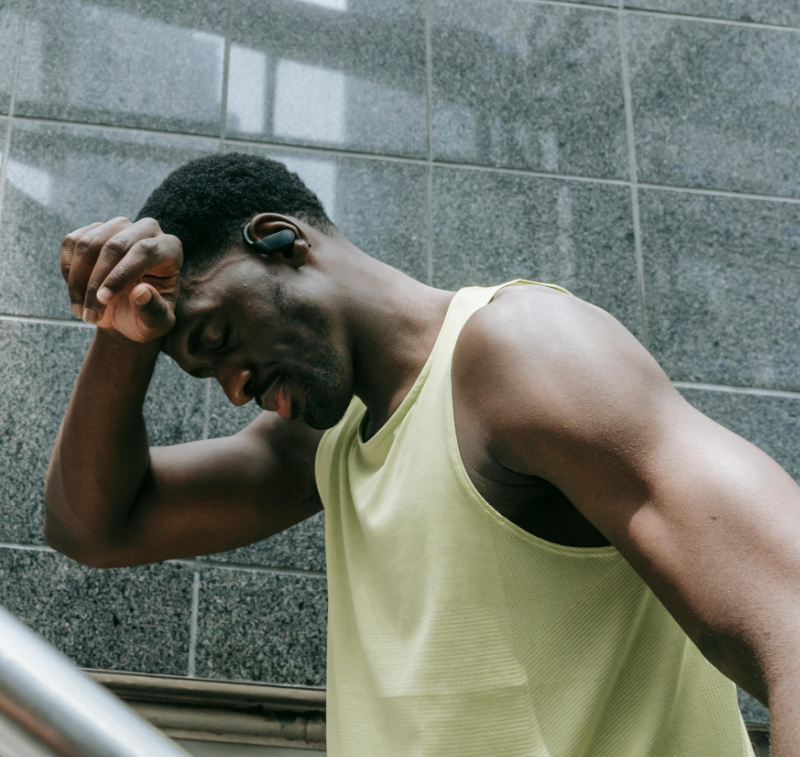Weight loss is a common reason to start running. And we absolutely support that idea, we support anything that gets you to start running. The conflict arises when you’re under eating and therefore comprising both your health and your enjoyment of the sport, which makes is really hard to stick to long term. And if we know anything about weight loss, it’s a long run kind of game! Luckily one of the interesting things we often see happen with runners is we start to WANT to eat better. We want to have the energy to run, to feel good and that means ensuring not just that we eat our greens, but that we truly eat enough.
Luckily one of the interesting things we often see happen with runners is we start to WANT to eat better. We want to have the energy to run, to feel good and that means ensuring not just that we eat our greens, but that we truly eat enough.
Underfueling can create a lot of issues not just in your training, but your daily life and health. One of the most commonly discussed issues is the Female Athlete Triad and the loss of a menstrual cycle. But there are so many other ways your body is speaking to you.
If it’s your goal, checkout our Running for Weight Loss Guide to go about it as smart as possible.
10 Signs You’re Underfueling
Coach Amanda has worked with and brought in so many Registered Dietitains over the last 20 years to assist our athletes. And she loves the ones that know weight loss is a health goal for many, so it can’t be discounted, but needs to be handled correctly.
Instead of following the old rules of cutting 500 calories a day, we’re going to really need to look at your overall energy expenditure. Then make little tweaks like planning carbohydrates around your workouts, increasing protein for muscle repair and sometimes changing training all together.
It’s ok to have a season where you stop marathon training and focus on more general fitness if weight loss is the primary goal. But weight loss and marathon training are very hard to go hand in hand.
These are 10 ways you know your body doesn’t appreciate the lack of fuel!
#1. You’re moody.
 Exercise depletes energy, so if there isn’t enough fuel in your body to begin with, it can affect your brain chemistry in negative ways.
Exercise depletes energy, so if there isn’t enough fuel in your body to begin with, it can affect your brain chemistry in negative ways.
Our brains run largely on glucose, and exercise uses it up faster than average. If you run low on glucose it can trigger a hypoglycemic episode, with symptoms of irritability, anxiety, and difficulty concentrating.
Your body releases cortisol, which is a stress hormone, to correct this energy deficit. Too much cortisol in the body leads to mood swings and restlessness as well.
In addition nutrients from food help integrate mood-regulating hormones like serotonin and dopamine, which are key in regulating mood.
Without enough fuel, your body lacks the essential components for a balanced brain chemistry, which can seriously throw off your mood.
#2. You’re constantly tired.
 Low blood sugar also causes fatigue, so not consuming adequate carbohydrates while on a training program can result in extreme fatigue.
Low blood sugar also causes fatigue, so not consuming adequate carbohydrates while on a training program can result in extreme fatigue.
Not eating frequently enough can deplete your muscles of glycogen, which is a form of carbs stored for energy. This causes you to be tired sooner during a workout, and your endurance and overall performance to suffer.
When your body is forced to break down muscle for energy instead of using its stored glucose and glycogen, you’ll experience an increase in fatigue both during and in-between exercise sessions.
#3. You have trouble sleeping.
The negative effects of under-fueling can kick your brain into survival mode, causing it to prioritize alertness over rest.
Those low blood-glucose levels can drop during recovery, causing adrenaline and cortisol to spike. This can result in delayed release of melatonin, a hormone that triggers the body’s readiness for sleep.
In addition, being hungry may be enough to wake you or make you restless while you try to sleep.
#4. You struggle with overeating sugar.
We’ve talked a lot about the effects of low blood sugar, and it shows up here, too. Your body knows that it needs food and the quickest way it can get energy is SUGAR.
Your brain and body will try to correct by craving/consuming foods high in sugar. Of course these are foods which are really easy to overeat.
In general, your body will try everything to try to compensate for the energy deficit created by training with too little in the tank. This applies to running fasted, skipping fueling during long runs or skipping your recovery meals.
Your hunger can become intense afterward, which makes it hard to control yourself around food.
Putting your body in this deficit also increases ghrelin, the “hunger hormone,” and decreases leptin, the “satiety hormone.”
#5. You’ve hit a progress plateau.

If your body doesn’t have enough stored energy at the start of a workout, you likely won’t be able to maintain any intensity. You’ll get tired faster and your muscles will take longer to recover and grow afterward.
Your body might even start to break down muscle tissue for energy, resulting in a catabolic state that works against muscle growth and fat loss goals.
Imbalances in your cortisol, testosterone, estrogen, and thyroid levels can also mess with progress, especially for women. They can increase muscle breakdown and fat storage, decrease energy levels, and slow down your metabolism in order to save energy.
You’re likely to see stalled fat loss, fatigue, and other issues as a result.
Checkout are article on working out but gaining weight to understand more of what’s happening here.
#6. You drag after workouts.
It’s not just feeling sluggish during your workout, it starts to impact the rest of your day.
Your strength, stamina, and mental focus all suffer when your body isn’t properly fueled. This makes your workout feel harder while you’re doing it, and stresses your body with a tougher recovery afterward.
Carbohydrates and protein in particular are necessary for repairing damaged muscle and boosting energy stores. This slows your recovery and can lead to extra soreness and fatigue.
#7. You experience brain fog.

Low blood sugar is a likely culprit here as well, since glucose is a primary source of energy for your brain. Mental fatigue, difficulty concentrating, and confusion are all side effects of hypoglycemia.
When glycogen stores are low your brain begins to compete with the muscles for energy. If there’s not enough to go around, your mental performance can suffer.
While moderate amounts of cortisol and adrenaline help you stay alert, too much can lead to mental fog and irritability.
Dehydration is another major contributor to brain fog during workouts.
#8. You tend to be cold.

Being cold often can sometimes mean a serious energy deficiency in your body, which generates heat by burning calories. If there aren’t enough calories to burn, your body slows your metabolism to conserve energy.
This in turn reduces heat output and leaves you chilled.
Another side effect of low blood sugar is shivering and chills, or sweating followed by cold as your body attempts to recalibrate.
Lastly, your body tends to prioritize blood flow to vital organs like your heart and brain, reducing circulation to your extremities and causing you to feel cold.
Feel like you’re eating enough, but still cold all the time? Learn more about iron deficiency in runners.
#9. Your bathroom habits are irregular.
When your energy stores are low, your body prioritizes sending blood to your muscles instead of your cut, which leads to both constipation and irregular timing of bowel movements.
Not eating or not eating enough can delay the triggering of the gastrocolic reflex, a process that stimulates the colon to move. This means less predictable bowel movements for you.
Your body also extracts fluids and fiber from food, and without enough of those things, your gastrointestinal tract will undoubtedly be sluggish.
#10. Increased inflammation markers in bloodwork.
If you have your blood drawn for any reason, some red flags of under-fueling could show up in your results.
It could manifest in low blood glucose levels, elevated cortisol levels and resulting changes in white blood cell count, markers of muscle breakdown like creatine kinase (CK) and lactate dehydrogenase (LDH).
Dehydration can also lead to diminished electrolytes like sodium, potassium, and magnesium, which could impact kidney parkers like elevated BUN or creatine.
Some people, more likely women, often see low iron or hemoglobin numbers in this scenario as well.
How Undereating Impacts Athletes
We all want to meet our fitness and training goals, and there is no doubt that the proper fuel is an absolute necessity to make that happen.
Not eating enough is going to hinder your progress. All of the above are what you might be noticeably feeling, but here’s what else is happening.
Poor Performance:
Not eating enough carbs while training results in lowered glycogen stores, which causes early fatigue, sluggishness, reduced pace, and a lack of intensity. All of this will result in you struggling to meet speed and endurance goals.
Mental Fog:
Poor concentration takes away from your ability to focus on form, pacing, breathing, and other aspects of training. It can also make it hard to stay engaged and motivated in the moment.
Muscle Breakdown:
If you don’t have sufficient stored energy, your body will turn to muscle tissue to make up the deficit. This undermines growth and can lead to loss rather than your desired gains.
Increased Risk of Energy:
Tired muscles combined with poor focus is a recipe for disaster, as you risk tripping or developing less-than-ideal form.
Hormonal Disruption:
Chronically elevated cortisol levels combined with a drop in thyroid and reproductive hormones affect metabolism and can result in RED-S (Relative Energy Deficiency in Sport). This energy imbalance can lead to a host of health and performance issues that affect multiple body systems.
Slowed Recovery/Repair:
The goal of training is to stress your system and recover stronger, but not giving your body enough fuel to start with stunts its ability to adapt with better endurance and speed. This leads to slower recovery and still feeling tired during your next training session.



 Sydney Marathon Course and Training Tips | How to Conquer the Hills
Sydney Marathon Course and Training Tips | How to Conquer the Hills
